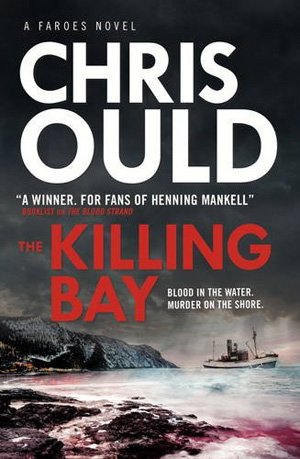
Reyna is a homicide detective, currently suspended from the force and under investigation for unprofessional conduct. He was actually born in the Faroes, but moved to the UK aged five after his mother’s suicide. His suspension meant he could take the time to go and meet his ailing father, Signar Ravnsfjall, and discover more about his roots in the Faroes. However, Ravnsfjall died of a stroke without Reyna ever getting to speak with him, but he did get to meet the serious local detective, Hjalti Hentze, and lend his talents to a murder investigation in the first book.
In The Killing Bay, the islands are abuzz with the arrival of the Atlantic Wildlife Conservation Alliance, an international environmental pressure group intent upon disrupting the grindarakstur, or grind – the tradition of herding pods of pilot whales towards the shore using dozens of boats, then slaughtering them in the shallows with knives. Ugly stuff. Members of the Alliance, recognisable by their foreign nationalities and distinctive blue sweatshirts, are not popular with the locals and tensions are running high.
Erla Sivertsen is the only Faroese member of the Alliance. She is new to the group and has no particular history of activism, but is the photographer for the Alliance and her images will be used in their campaign material. After the first grind of the season has been carried out, her body is found hidden in the long grass behind a remote cottage.
There are signs of a head injury, she’s been stabbed, is partially undressed, and there is the suggestion that she was raped. Forensic evidence also suggests her corpse was moved post mortem, and someone, presumably the murderer, has spray-painted “Fuck the whales” on the cottage walls.
For the investigators, things go wrong from the start. Vital forensic evidence is lost en route to Denmark, which has legal governance over the Faroes. The officer in charge of the investigation, the hot-headed Inspector Ari Niclasen, seems to have pre-conceived ideas as to how to proceed.
There are two distinct narratives, with some overlap. The murder investigation is seen through the calm, methodical eyes of Hentze, and we witness his frustration with Niclasen’s leadership. Another problem for Hentze is more personal – it seems his son-in-law had an affair with Sivertsen, making the man a prime suspect. Ould, who has experience writing television crime dramas, has a good grasp of the police procedural, and the investigation is accurate and absorbing.
The second strand to the narrative is Reyna’s investigation of his late mother’s life. She was a free spirit, and her relationship with Ravnsfjall would probably have been a brief one if she hadn’t become pregnant. After Reyna’s birth, she spent some time in a mental institution in Denmark before returning to the Faroes to live in a commune.
Reyna is repeatedly frustrated in his efforts to find out more, and it looks like a lot is being held back for the next book in the series. The pace of the book is pretty slow, and the diversions into Reyna’s personal quest slow it further. In some ways this is quite appropriate – it matches Hentze’s methodical process and perhaps the bucolic nature of life on the islands, but it can mean your attention will wander. The enjoyment of experiencing Reyna’s personal journey of discovery is some consolation, but the strongest elements of the book are the setting and the procedural detail.
Read our interview with Chris Ould here, and also see this feature about why you shouldn’t set your book in the Faroe Islands.
Titan Books
Print/Kindle/iTunes
£2.84
CFL Rating: 3 Stars